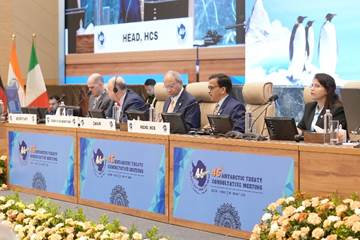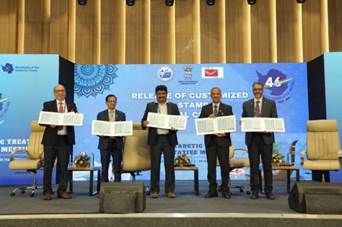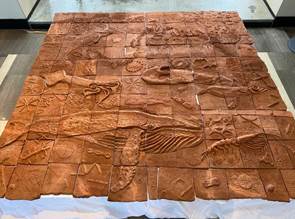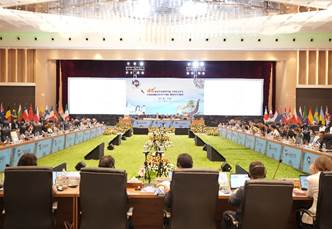India successfully concludes hosting of the 46th Antarctic Treaty Consultative Meeting (ATCM-46) and the 26th Committee on Environmental Protection (CEP-26)
India successfully concluded hosting of the 46th Antarctic Treaty Consultative Meeting (ATCM-46) and the 26th Committee on Environmental Protection (CEP-26) from May 20th to May 30th, 2024 in Kochi, Kerala.
Shri Kiren Rijiju, Union Minister, Ministry of Earth Sciences and Ministry of Food Processing Industries, announced India’s plan to set up an Antarctic research station, Maitri-II.
The ATCM-46 was held with the overarching theme of Vasudhaiva Kutumbakam, a Sanskrit phrase that means one Earth, one family, one future. This resonates deeply with the Antarctic Treaty System, which promotes peace, scientific cooperation, and the preservation of Antarctica for mankind. ATCM-46 was inaugurated by the Honourable Union Cabinet Minister, Shri Kiren Rijiju, Ambassador Pavan Kapoor, Secretary (West), Ministry of External Affairs and Dr Shailesh Nayak, former Secretary of MoES and Director, National Institute of Advanced Studies, Bengaluru. Ambassador Pankaj Saran, former Deputy Adviser to the National Security Board, was elected as the Chair of the 46th ATCM. Dr Vijay Kumar, Scientist G-Adviser, MoES, was the Head of the Host Country Secretariat.

Dr. M. Ravichandran, Secretary, MoES and Head of the Indian delegation (host country), informed that soon India will be submitting comprehensive environmental evaluations for establishing Maitri-II. He said, “The successful hosting of the 46th ATCM and 26th CEP in India underscores our collective resolve to safeguard Antarctica’s unique ecosystems and promote global environmental sustainability. Through dialogue, cooperation, and concerted action, we can ensure that Antarctica remains a beacon of peace, science, and environmental protection for generations to come.”
The ATCM-46 and CEP-26 were hosted by the Ministry of Earth Sciences, Government of India, through the National Centre for Polar and Ocean Research (NCPOR), Goa, with support from the Antarctic Treaty Secretariat headquartered in Argentina. The event witnessed the reaffirmation of the Antarctic Treaty (1959) and the Protocol on Environmental Protection to the Antarctic Treaty (the Madrid Protocol, 1991) by the Parties. The ATCM and CEP are crucial global forums for Antarctic affairs convened annually that set collective and concerted dialogue and action towards preserving one of Earth’s most pristine and fragile ecosystems. An additional working group discussed the development of a tourism framework for the southern white continent this year.
The CEP-26, held from May 20 to 24, 2024, addressed a range of issues and contributed to the implementation of the Environmental Protocol in Antarctica. The Committee agreed to prioritize further work on the management implications of sea ice change, enhancing environmental impact assessment of major activities, protecting the emperor penguin, and developing an international framework for environmental monitoring in Antarctica. Following the advice of the CEP, the Parties adopted 17 revised and new management plans for ASPAs (Antarctic Specially Protected Areas) and several modifications and additions to the list of Historic and Monument sites. The ATCM also encouraged efforts to increase renewable energy use and to ensure robust implementation of biosecurity measures to minimize the risks of Highly Pathogenic Avian Influenza.
To mark the ATCM-46 and CEP-26, NCPOR (MoES) organised several side events. It organized a seminar entitled ‘Changing Antarctic and Challenges Ahead’ jointly with the Korean Polar Research Institute and Polar Cooperation Research Centre, Kobe University, on May 20, 2024, comprising two panel discussions themed ‘Challenges in Antarctic governance’ and ‘Shared responsibilities and commitments for Antarctic future’.

The release of a commemorative MyStamp marking the ATCM-46
Mystamp customised with the ATCM-46 logo was released in collaboration with India Post.

A mural depicting species-rich Antarctica designed by school students
A mural themed ‘Species-rich Antarctica’ designed by school children, aimed at enhancing awareness of Antarctica amongst young minds, was unveiled in collaboration with Germany, ASOC, and its partners. A panel discussion on ‘Antarctic Synergy: Driving Scientific Progress through Diplomacy, fostering Cooperation through Research’ was organized as an outreach effort for college students from Kochi, Kerala. Dr. Thamban Meloth, Director, NCPOR, congratulated his team for successfully hosting the high-level Antarctic meetings in Kochi. “Our active and strategic participation in Antarctic affairs, India’s polar programme and its role as host showcased our dedication to fostering global partnerships and advancing the cause of environmental conservation on a global stage,” he said.
The Parties also discussed several important Antarctic matters, including liability, biological prospecting, exchange of information, education and awareness, a multi-year strategic work plan, safety, inspections, science, future science challenges, scientific cooperation, climate change implications, and tourism management, amongst others. A significant outcome was the adoption of a decision to develop an ambitious, comprehensive, flexible, and dynamic framework for regulating tourism and non-governmental activities in Antarctica. The parties also discussed consultative status requests from Canada and Belarus, but no consensus was reached.

Glimpses from the ATCM-46 and CEP-26 in Kochi, Kerala
India hosted 400+ delegates from 56 countries at the global meeting on Antarctic affairs which brought together diplomats, scientists, and experts to discuss a variety of Antarctic matters, including science, policy, governance, logistics, operations, environmental stewardship, etc. The meetings were in-person events with a virtual audience.

